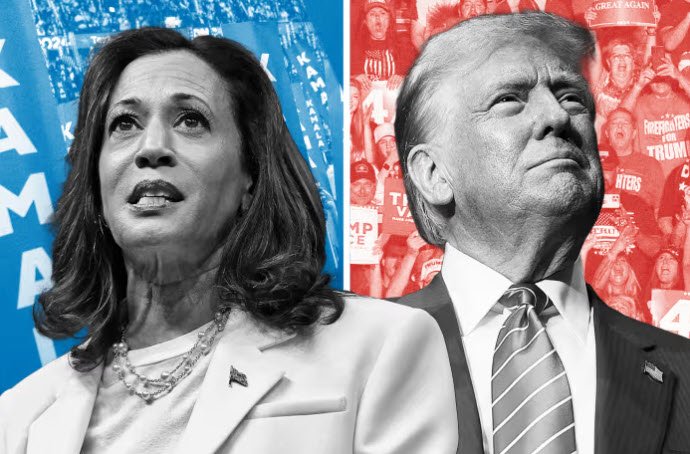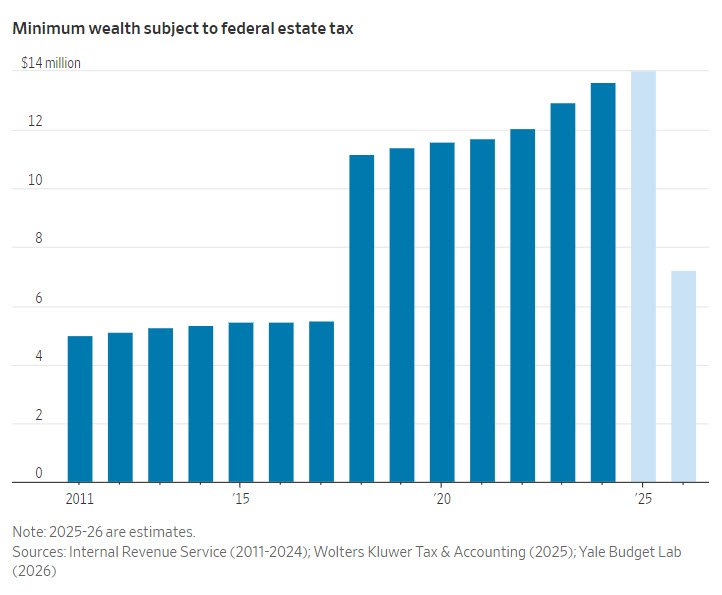
By Ashlea Ebeling
Sept. 16, 2024
With the presidential race in a dead heat, rich Americans are calling estate lawyers.
The wealthy want to know if they should take steps to protect their fortunes from higher estate taxes. Should a change under the 2017 tax cuts expire as scheduled after 2025—considered more likely with Vice President Kamala Harris in the White House and Democrats gaining the majority in Congress—the minimum wealth subject to the estate tax would be halved to roughly $7 million per person.

The estate-tax landscape could change dramatically, depending on who wins the White House. Illustration: Parker Eshelman/WSJ, Gabriella Demczuk for WSJ, Getty Images (2), Bloomberg News
At that level, nearly 9,000 estates would owe estate tax in 2026, according to the Urban-Brookings Tax Policy Center. That is compared with roughly 4,000 estates estimated to owe the tax in 2025.
Whether it pays to draft a fail-safe estate plan for tax policies that haven’t been decided is up for debate.
Financial advisers and wealth managers say that the cost of hiring them is justified for many families. By making large lifetime gifts and setting up certain types of trusts for spouses or children, people can remove millions from the balance subject to the estate tax.
Those advisers also say the window for people to make such tax-saving moves is shrinking—and that it pays to do the work ahead of time if you are considering a trust.
But there are costs and risks of putting money into trusts unnecessarily, including capital-gains taxes that wouldn’t apply to an outright inheritance.
There is also no guarantee the moves are even warranted for those under the higher estate tax thresholds. Though some Democrats in Congress favor an estate-tax overhaul that would go beyond just letting the Trump cuts expire, Harris herself hasn’t staked out a position. Her campaign didn’t respond to requests for comment.
Amy Elliott, a lawyer in Danville, Ind., helped her 77-year-old father set up an irrevocable trust this year. He funded it with $1 million this summer and is waiting until after the election to decide how much more, if any, to add to it.
“We’ll move forward with funding if we’ve got a Democratic Congress and White House,” Elliott said.
Former President Donald Trump wants to make the higher estate-tax limit permanent, along with the rest of the 2017 tax cuts, his campaign said. In a divided government, this will become part of messy, complex negotiations over trillions of dollars in expiring tax cuts. A Republican sweep, meanwhile, could make repealing the estate tax altogether a remote possibility.

Shedding millions
Even without the election, many more families have been setting up trusts in recent years to protect assets from creditors and divorce settlements, as well as for estate-tax savings.
The maximum wealth someone can die with—or give away—without owing the estate tax is $13.61 million today. That limit is indexed for inflation, and projected to reach $13.99 million for 2025, according to Wolters Kluwer Tax & Accounting. With proper planning, a married couple can shield twice that from the estate tax. The top estate tax rate is 40%.
By giving away assets now to their children outright or in an irrevocable trust, the rich can essentially lock in the current estate tax exemption, potentially saving millions of dollars in taxes at death. An irrevocable trust generally cannot be changed unless all the beneficiaries agree, or a court approves the changes.
Once the assets are in the trust, they are out of your estate, and in most cases out of your control.
Tim Starkey, a financial planner in Morristown, N.J., said he helped a client worth about $50 million set up irrevocable trusts for himself and his wife last year, in anticipation of the tax cuts’ expiration and to get in front of the chance Democrats sweep in November.
They funded the trusts with $24 million in private-equity assets, and plan to add more to the trusts this year and next as the exemption climbs with inflation adjustments. “We set up the foundation,” Starkey said.
The stakes are high, especially if Democratic proposals to close certain strategies come into play, said Robert Keebler, a CPA in Green Bay, Wis.
President Biden’s budget proposes to curb dynasty trusts, which allow families to avoid estate tax for many generations, and to revise rules for valuing property put in trusts so people couldn’t take big discounts.
The Biden plan would also change trust rules that let the person who set up the trust pay the trust income taxes and essentially shift more wealth to heirs tax-free. The Harris campaign has said that it supports the Biden budget proposals broadly.
If you don’t have $50 million…
Unmarried individuals worth at least $7 million, and married couples worth $14 million and up, should talk about the estate tax, estate lawyers said. The discussion includes how old you are and what assets you own.
“It’s not just a snapshot right now. You need to think about your net worth in the future,” said Aaron Burton, an estate lawyer in Denver.
You also need to think about how much you’re willing to give away. The timing might be right for the tax laws, but not for your personal needs, said Ross Riskin, a CPA and financial planner in Newtown, Conn.
Still, setting up a trust takes time. If spouses are setting up trusts for each other, it could pay to do one now and the other next year.
“You can get things set up and pull the trigger later,” said Martin Shenkman, an estate lawyer in New York.
Second thoughts
There is also a big risk to acting before the government finalizes a plan.
Many Americans made wealth moves to avoid the estate tax in 2012. At that time, financial advisers warned clients that the exemption could drop from $5 million to $1 million. Some people who made big gifts using irrevocable trusts at that time later had second thoughts.
Dawn Jinsky, an accountant and financial planner with Plante Moran in Southfield, Mich., had a recent conversation with a married couple in their mid-50s worth $35 million who decided not to proceed with an irrevocable trust.
“They didn’t want to regret the decision,” she said. They are looking at other ideas, including making annual tax-free gifts.
Anyone can give tax-free gifts of up to $18,000 to an unlimited number of people this year. These gifts don’t count against the larger $13.61 million combined gift- and estate-tax exemption. The annual tax-free gifts limit is estimated to be $19,000 for 2025, according to Wolters Kluwer Tax & Accounting.
That could change.
One proposal in Sen. Elizabeth Warren’s housing bill calls for a limit of $10,000 per gift and a total annual cap on tax-free gifts anyone can give in a year of $20,000. The Warren bill also calls for a return to a $3.5 million estate tax exemption and higher estate tax rates.
Write to Ashlea Ebeling at ashlea.ebeling@wsj.com
Dow Jones & Company, Inc.



